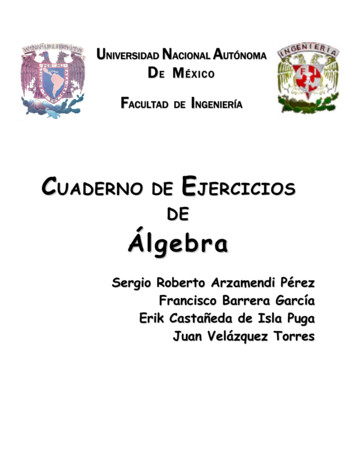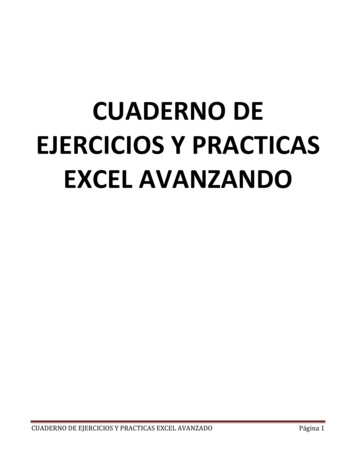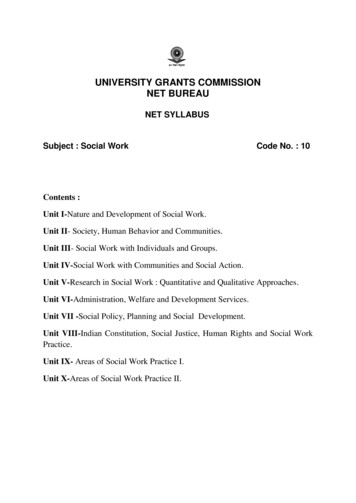
Transcription
Year 9 – Grammar bookletCuaderno de GramáticaAlumna:
Year 9 – Grammar bookletSUBJECT PRONOUNS1ST PERSON SINGULAR2ND PERSON SINGULAR3RD PERSON SINGULARYO - ITÚ – YOU (ONE PERSON, INFORMAL)ÉL – HEELLA – SHEUSTED – YOU (ONE PERSON-FORMAL)RD(THERE IS NOT ‘IT’ FOR SUBJECT PRONOUNS, BUT WHEN YOU NEED TO SAY ‘IT’, USE THE 3 PERSON ENDING OF THE VERB – HE/ SHE ENDING)1ST PERSON PLURAL2ND PERSON PLURAL3RD PERSON PLURALNOSOTROS – WEVOSOTROS – YOU (MORE THAN ONE – INFORMAL)ELLOS –THEYELLAS – THEY (ONLY GIRLS)USTEDES – YOU (MORE THAN ONE PERSON-FORMAL)The Present tense / el PresenteI play / I am playing T he Present tense describes an action which is happening at the moment :Ex: I am listening yo escucho It also describes an action which happens regularly or repeatedlyEx: Every day I wake up around 7am todos los días me levanto a eso de las siete.1. Regular Verbs / los verbos regularesChop off the –AR, -ER or –IR and add the relevant ending.TIME esaeeWeamosemosimosYou(pl)áiséisísTheyanenenFor example:Tomar to takeTo form “we take” : TOMAR tom tomamos
Year 9 – Grammar bookletPractice – Práctica1.Complete with the correct subject pronouna. estudiamos español desde hace 3 añosb .¿ vendéis una casa en el centro de la ciudad?c. compro el periódico todos los díasd. toma tostadas para el desayunoe. salen los domingos por la nochef. viajas a menudo ¿verdad?g. termina el cole a las cuatro y mediah. empezamos el cole a las ocho y mediai. hablo tres idiomas: inglés, francés y alemánj. lee muchas novelas2.Regular –AR verbs. Fill in the appropriate forms, using the verbs in the box below.Trabajar to workEstudiar to studyComprar to buyABCDEFGH3.I buyShe walksYou (pl) payWe wearYou (sg) prepareHe hopesThey workI studyIJKLMNOEsperar to hopeAndar to walkLlevar to wear15You (sg) enterThey hopeYou (pl) walkWe workHe buysI walkYou (sg) studyRegular –ER verbs. Fill in the appropriate forms, using the verbs in the box below.Aprender to learnRomper to breakComer to eatABCDEFGHPreparar to preparePagar to payEntrar to enterHe eatsThey drinkWe sellYou (pl) runI learnYou (sg) readShe believesI breakLeer to readCorrer to runBeber to drinkCreer to believeVender to sellMeter to putIJKLMNOWe learnYou (sg) putHe runsThey readWe breakI readShe drinks15
Year 9 – Grammar bookletRegular –IR verbs. Fill in the appropriate forms, using the verbs in the box below.4.Discutir to discussEscribir to writeABCDECubrir to coverRecibir to receiveThey writeYou (pl) discussI coverHe opensYou (sg) climbFGHIJAbrir to openSubir to climb10She climbsI discussWe receiveYou (pl) writeHe receives2. Reflexive verbs los verbos pronominalesReflexive verbs describe activities where the action is reflected back onto the subject of the verbex: I wash myselfHe dresses himselfThe idea of ‘self’ is conveyed by using reflexive pronouns e.g. I wash myself me lavoLAVARSE – to wash oneselfyomelavoI wash / am washing (myself)tútelavasYou wash (yourself)él/ellaUstedselavaHe/she washes (him/herself)You wash (yourself)nosotros,noslavamosWe wash (ourselves)vosotros,oslavaísYou wash(yourselves)ellos/ellasUstedesselavanThey wash (themselves)Practice – PrácticaRegular reflexive verbs. Fill in the appropriate forms, using the verbs in the box below.Afeitarse to shaveLavarse to wash oneselfLlamarse to be calledCasarse to get marriedVerse to see oneselfABCDEFGHIJKLMNOI wash myselfThey get angryYou (pl) take a showerHe is calledThey get marriedIt becomesYou (sg) shaveWe becomeI worryYou (sg) wash yourselfShe gets marriedHe shavesThey comb their hairWe see ourselvesYou (sg) worryDucharse to take a showerPeinarse to comb one’s hairEnojarse to get angryPonerse to becomePreocuparse to worry15
Year 9 – Grammar booklet3. Stem-changing Verbs / verbos con cambio re raízSome verbs change their stem before you add the ending. This change occurs in the second vowel to the last of theinfinitive and is purely for pronunciation reasons.e iePENSAR (to think) pens piens piensou ueJUGAR (to play) jug jueg juegoo uePODER (to be able to) pod pued puedoe iePEDIR (to ask) ped pid pidoThese changes only occur for YO, TÚ, EL/ELLA/USTED & stedNosotros/asVosotros/asEllos/Ellas/UstedesO UEueueueooueRADICAL CHANGEU UEE IE E Iueieiueieiueieioeeoeeueiei-AR-ER-IRPractice – PrácticaStem-changing verbs in the Present Tense1.a.b.c.d.e.2.a.b.c.d.e.The following verbs change their stem e - ie. Fill in the appropriate forms:EmpezarAcertarPensarRecomendarEncender(to begin)(to guess)(to think)(to recommend)(to switch on)she thinkswe extendthey recommendhe beginswe recommendf.g.h.i.j.I switch onyou (sg) beginyou (pl) guessI thinkhe switches onThe following verbs change their stem o - ue. Fill in the appropriate forms.VolverContarRogarAprobarRenovar(to return)(to count)(to ask)(to approve)(to renew)he countsthey askI approveyou (sg) returnwe renewf.g.h.i.j.she triesyou (pl) askI countwe returnyou (sg) renewExtender(to extend)Probar(to try)
Year 9 – Grammar booklet3.a.b.c.The following verbs change their stem e - ie. Fill in the appropriate forms.MentirInvertirPreferir(to tell lies)(to invest)(to prefer)he tells liesd.you (sg) preferyou (pl) investe.I feelwe feelf.they tell lies4. Regular stem-changing verbs. Fill in the appropriate forms using the verbs in the box below.Aprobar (o ue) to approveMorder (o ue) to biteNegar (e ie) to denyFregar (e ie) to wash upServir (e i) to serveABCDEFGHIJKLMNOSentir(to feel)You (sg) denyHe approvesWe serveYou (pl) sayShe countsI approveI biteI denyYou (pl) flyWe wash upI repeatHe repeatsThey wash upIt bitesThey tell a lieVolar (o ue) to flyContar (o ue) to countMentir (e ie) to tell a lieRepetir (e i) to repeatDecir (e i) to say
Year 9 – Grammar booklet5.Irregular Verbs los verbos irregularesNext year we shall see more irregular verbs but in the meantime it is importantyou know the entire list below as they are some of the most common:Ser (to be)soyeresessomossoissonIr (to go)voyvasvavamosvaisvanTener (to have)tengotienestienetenemostenéistienenPoder (to be able)puedopuedespuedepodemospodéispuedenEstar (to ishacenQuerer (to ir(to say)digodicesdicedecimosdecísdicen1. Fill in the blanks with the appropriate forms of ser or estar:a.b.c.d.e.f.g.h.Un vaso de cerveza sobre la mesa.Madrid en España.El hombre comiendo en el café.Alfonso profesor.La mujer furiosa.Las camisas de poliester.Yo inglés.El colegio grande y moderno.2. Learn the above irregular verbs, hide the list and try to write in the 6 forms of each of these irregular verbs:Tener(to have)Decir(to say)Poder(to be able to)Querer(to want)Hacer(to do/make)Ir(to go)
Year 9 – Grammar booklet3. Fill in the appropriate verb forms sing the infinitives given in brackets:Seis hombres (estar) en un café. Hay un inglés, un francés, un español, un alemán, un ruso y unchino. (Hacer) mucho calor y todos (tener) sed. Cada persona (tener)un vaso de cerveza. Hay también seis moscas en el café, y las moscas (tener) también sed. Unamosca cae en el vaso del inglés, otra mosca cae en el vaso del francés .etc. El inglés (ir) a beber y ¡Vela mosca ! Llama al camarero, que trae otro vaso de cerveza. El francés ve también la mosca que (estar)nadando en la cerveza. (Estar) furioso, jura, da gritos. El español mira la mosca, (hacer)un gesto y sale del café. El alemán retira la mosca y bebe la cerveza. El ruso bebe la cerveza y las mosca.El chino toma la mosca con los dedos, contempla al pobre insecto, come la mosca y bebe la cerveza.Time expressions used with the present tense:NORMALMENTE/ GENERALMENTE usuallyTODOS LOS DIAS every dayAHORA nowSIEMPRE alwaysNUNCA neverA VECES a timesMUCHAS VECES often (many times)DE VEZ EN CUANDO from time to timeHOY todayCADA DIA every dayA MENUDO often
Year 9 – Grammar bookletThe Preterit tense / el PretéritoI played The Preterit tense is used to describe a single, completed action in the past or an action that took place over adefined period of time.Ex: Last summer I spent 3 weeks in Cuba el verano pasado pasé tres semanas en Cuba.1. Regular Verbs / los verbos regularesChop off the –AR, -ER or –IR and add the relevant ending.I-AREndings-ER-IRéÍÍHablar - to talkyo hablénosotros hablamostú hablaste vosotros imosimosYou(pl)asteisisteisisteisTheyaronieronél hablóelloshablaronComer - to eatyo comínosotros comimostú comiste vosotros comisteisél comióelloscomieronVivir - to liveieronyo vivínosotros vivimostú vivistevosotros vivisteisél vivióellosvivieronPractice – PrácticaFill in the regular Preterites using the infinitives given below.enseñaraprenderviajarcruzar(to teach)(to learn)(to travel)(to cross)a.b.c.d.e.f.g.h.i.j.k.l.They taughtHe learnedI travelledWe wroteYou (sg) putShe crossedYou (pl) wroteI learnedWe taughtYou (pl) putThey travelledYou (sg) crossedescribir(to write)meter(to put)
Year 9 – Grammar booklet2. Irregular Verbs los verbos irregularesAndar (to walk)anduve, anduviste, anduvo, anduvimos, anduvisteis, anduvieronCaber (to fit)cupe, cupiste, cupo, cupimos, cupisteis, cupieronDar (to give)di, diste, dio, dimos, disteis, dieronDecir (to say)dije, dijiste, dijo, dijimos, dijisteis, dijeronEstar (to be)estuve, estuviste, estuvo, estuvimos, estuvisteis, estuvieronHacer (to do)hice, hiciste, hizo, hicimos, hicisteis, hicieronIr (to go)fui, fuiste, fue, fuimos, fuisteis, fueronPoder (to be able)pude, pudiste, pudo, pudimos, pudisteis, pudieronPoner (to put)puse, pusiste, puso, pusimos, pusisteis, pusieronProducir (to produce)produje, produjiste, produjo, produjimos, produjisteis, produjeronQuerer (to want)quise, quisiste, quiso, quisimos, quisisteis, quisieronSaber (to know)supe, supiste, supo, supimos, supisteis, supieronSer (to be)fui, fuiste, fue, fuimos, fuisteis, fueronTener (to have)tuve, tuviste, tuvo, tuvimos, tuvisteis, tuvieronTraer (to bring)traje, trajiste, trajo, trajimos, trajisteis, trajeronVenir (to come)vine, viniste, vino, vinimos, vinisteis, vinieronVer (to see)vi, viste, vio, vimos, visteis, vieronFill in the irregular Preterits.a.b.c.d.e.f.g.h.i.j.k.l.Practice – PrácticaIt fittedThey sawWe were ableI hadHe was (ser)You (sg) saidThey producedShe broughtI gaveYou (pl) wantedI was (estar)We wentm.n.o.p.q.r.s.t.u.v.w.x.You (sg) cameWe walkedHe didThey putI knewWe knewYou (pl) cameShe wentYou (sg) sawI wentI was (ser)We said
Year 9 – Grammar bookletThe Imperfect tense / el ImperfectoI used to play / I was playing It is also used to indicate what used to happen in the past, habitual or repeated actions in the pastex: I used go out every night last summer solía salir todas las noches el verano pasado It is also used for description in the past:ex: It was raining every day llovía todos los días1. Regular Verbs / los verbos regularesChop off the –AR, -ER or –IR and add the relevant ending:-AR-ER / -IRIabaíaYou (sg)abasíasHe/she/itabaíaWeábamosíamosYou (pl)abaisíaisTheyabaníanBEBER to drinkTo form “We used to drink”BEBER beb bebíamosPractice – PrácticaFill in the regular imperfectsComer (to eat)1.2.3.4.5.6.7.8.9.10.11.12.firmar (to sign)elegir (to choose)prometer (to promise)Olvidar (to forget)buscar (to search)I was eatingYou (pl.) were eatingYou (pl.) were signingYou (sing.) used to searchHe used to promiseThey used to promiseYou (sing.) were choosingWe were promisingI used to forgetYou (pl.) used to chooseShe was searchingThey were forgetting2. Irregular Verbs los verbos irregularesSer(to be)eraeraseraéramoseraiseranIr(to go)ibaibasibaíbamosibaisibanVer(to see)veíaveíasveíaveíamosveíaisveían
Year 9 – Grammar bookletThe Future tenses / el FuturoI am going to play / I will playing1. The Immediate FutureIn English:I am going to playHe is going to seeYou’re going to doUse the appropriate part of the verb IR (to go) a infinitive.IRvoyvasvavamosvaisvanJugar to playTo form “We are going to play”Vamosa jugarPart of IR a infinitivePractice – Práctica1. Fill in the immediate future tenses using the infinitives given below and the verb ir.amarregresarsubircubrir(to love)(to return)(to climb)(to cover)prometervenderenseñardecir(to promise)(to sell)(to teach)(to say)a.b.c.d.e.f.g.h.i.j.He is going to return.We are going to cover.I am going to climb.They are going to teach.You (pl) are going to say.She is going to sell.You (sg) are going to promise.It is going to be.They are going to love.I am going to study.ser(to be)estudiar(to study)2. Fill in the gaps in these future plans using the words in the box.Mañana, a salir con mi madre. Vamos hacer compras en la ciudad de Barcelona.a coger el tren a las nueve y media, y el tren a llegar en Barcelona a las once. Voy aropa para mis vacaciones y un regalo de cumpleaños para mi novio. Mi madre y yo vamos aen un restaurante donde trabaja mi primo. Mi tía va venir al restaurantetambién. Mi madre va a a casa a las tres, y yo voy quedarme en casa de mi tía.AAAComerComprarVaVamos VolverVoy
Year 9 – Grammar booklet2. The Future tense of regular verbs / el Futuro de los verbos regularesIn English:I will playHe will seeYou will doThe Future Tense is formed by adding endings onto the infinitive:ENDINGSIYou (sg)He / She / ItWeYou (pl)TheyJugar to
cuaderno de gramática . alumna:_ year 9 – grammar booklet subject pronouns . st1 person singular yo - i nd2 person singular tÚ – you (one person, informal ) rd3 person singular Él – he ella – she . usted – you (one person -formal) (there is not ‘it’ for subject pronouns, but when you need to say ‘it’, use the 3 .
